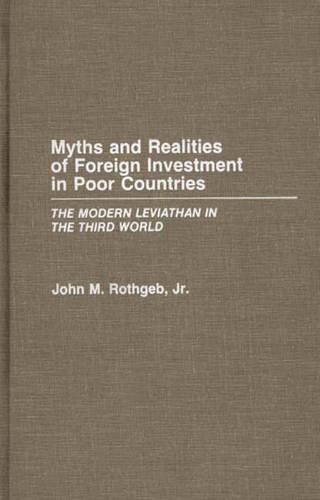
Myths and Realities of Foreign Investment in Poor Countries: The Modern Leviathan in the Third World
(Hardback)
Publishing Details
Myths and Realities of Foreign Investment in Poor Countries: The Modern Leviathan in the Third World
By (Author) John Rothgeb
Bloomsbury Publishing PLC
Praeger Publishers Inc
1st June 1989
United States
Classifications
Tertiary Education
Non Fiction
332.67314
Physical Properties
Hardback
162
Description
This book systematically explores the effects upon underdeveloped countries of direct foreign investments made by multinational corporations. The author pays particular attention to themes prevalent in the international political economy literature that depict foreign investment as alternately aiding or hindering economic development in the Third World. In constructing his analysis, Rothgeb treats the relationship between the multinational corporation and the underdeveloped host state as a political relationship, demonstrating that the results of foreign investment depend in large part upon the differing strengths of the actors in the relationship and how they use the advantages derived from their power. Following an introductory chapter which reviews the current status of research on the subject, Rothgeb turns to a consideration of how foreign investments affect host state foreign policy. He then addresses the domestic political and social effects of foreign investment and identifies four basic conceptions of the role played by foreign investment. Finally, Rothgeb focuses on economic growth, analyzing the ways in which multinational firms affect growth via their effects on capital availability, the degree to which the government plays a leading role in managing society, and changes in the composition of the local labor force. The author's conclusions regarding the political effects of foreign investment should be required reading for students of economic development and international relations, as well as for policymakers and executives of multinational firms.
Reviews
The author says in his introduction "the direct investments across international borders that are made by multinational firms are increasingly seen as important links binding states to one another and as having possibly vast political, social, and economic implications both for the society receiving the investments and for the state from which the investments originate." Multinational firms have much greater political and economic influence in Third World countries than in the developed countries where they generally are headquartered.-Booknotes
"The author says in his introduction "the direct investments across international borders that are made by multinational firms are increasingly seen as important links binding states to one another and as having possibly vast political, social, and economic implications both for the society receiving the investments and for the state from which the investments originate." Multinational firms have much greater political and economic influence in Third World countries than in the developed countries where they generally are headquartered."-Booknotes
Author Bio
JOHN ROTHGEB, JR., is Associate Professor of Political Science at Miami University. He is the author of numerous articles on international development and conflict in leading political science, international relations, and international development journals.
